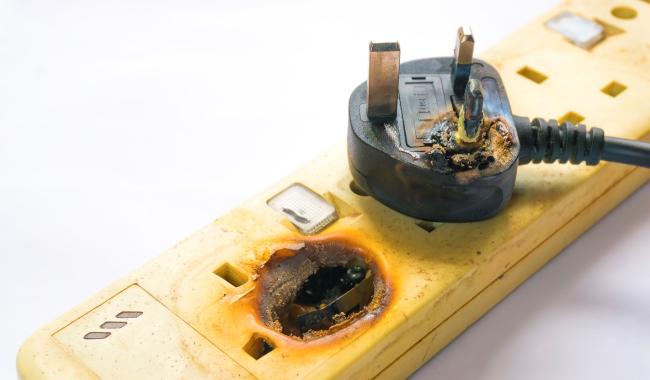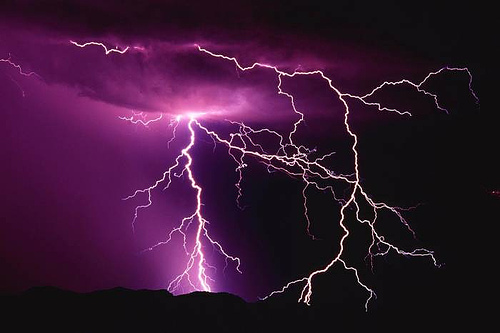
Jun 17, 2016 | Safety and Security
The arrival of summer brings with it sun, fun and plenty of time spent outdoors, particularly when trying to catch up with projects around the house.
When tackling those household jobs, don’t forget to keep safety in mind, particularly around electricity. Statistics indicate that about 400 people are electrocuted each year in the U.S. and thousands more are injured as a result of electrical incidents. Summer is typically the prime season for those types of injuries.
7 Tips to help keep you safe while trying to check off all those items on your summer to-do list.
1. Be wise around wires. Summer is thunderstorm season, and while we’ve made significant investments in strengthening our system, fierce thunderstorms may bring down lines. No matter what the season, stay at least 10 feet away from fallen power lines and always assume that the wire is energized. Report the fallen wires to 1-800-DIAL-PPL.
2. Climb with caution. The summer months are a good time to do maintenance on roofs, trees, and shutters. When climbing ladders to do those jobs, be aware of any power lines that may pose a risk and avoid making contact with those lines. Always stay at least 10 feet away from those lines and make sure anything you are holding or touching is at least 10 feet away.
3. Before digging, call 811. Summer is prime yard work season. If a home improvement or landscaping project requires digging with power equipment, make a toll-free 811 call three business days before work starts to request a survey of underground utilities. Call 811 if it appears digging in your neighborhood is being done without a survey.
4. Keep power equipment away from water. If you undertake a yard project that requires power tools and extension cords near a pool, pond or water fountain, make sure to keep those devices and cords away from water and wet grass. Make sure that the cord used for the tool is plugged into a ground fault circuit interrupter.
5. Don’t overextend power cords. When cutting the grass or trimming weeds with electric-powered equipment, make sure extension cords aren’t damaged or frayed. Don’t overload them and don’t use multiple extension cords together.
6. Hold on to those balloons. Graduations and pool parties are summer staples. If your preparation for a party involves Mylar balloons, make sure to tie them down. They can cause power outages if they touch electrical lines.
7. Be cool AND safe. When you return indoors from a day of outdoor chores, you want a safe, properly functioning air conditioning system. Have a licensed inspector look over the system to make sure it’s operating safely and efficiently.
For more on electrical safety, visit pplelectric.com/safety.

Jun 14, 2016 | Safety and Security
Mother Nature’s electrical fireworks can be deadly. Nearly 50 people are killed by lightning each year in the U.S. and hundreds more are severely injured.
Courtesy of the National Weather Service, check out a few lightning myths and facts to stay safe:
MYTH: If trapped outside during a lightning storm, lie flat on the ground.
FACT: Lying flat just increases your chance of getting hit by potentially deadly ground current. Keep moving toward a safe shelter.
MYTH: If there is no rain or clouds, you’re safe from lightning.
FACT: Lightning has a long reach. “Bolts from the blue” can strike 10-15 miles from a thunderstorm.
MYTH: A lightning victim is electrified and you risk electrocution if you touch them.
FACT: The body does not store electricity and it’s perfectly safe to give first aid. Don’t be afraid to come to their aid. You could save a victim’s life.
For more electrical safety tips, visit pplelectric.com/safety.
Jun 12, 2016 | Energy Efficiency
Our bags are packed, the calendar is marked and it’s FINALLY time for vacation! There’s nothing better than kicking back, relaxing and spending quality time with family and friends. But before we go, there are a few teensy-weensy energy-saving tasks I’ll need to check off the to-do list.
In all the hustle and bustle of the days leading up to vacation, things can get downright hectic. With all the commotion, it’s easy to forget to give the house a little TLC in preparation of our absence. Making sure it’s safe and secure is at the top of the list, but there are a few other tasks that we do to help save electricity while we’re gone.
Prepping the house is quick and easy. Just a few simple steps will help keep it from using – or wasting – energy while we’re away.
Four Easy Steps to Lower Energy Use While Traveling
- Adjust the thermostat. Why waste energy cooling the house while we’re not there. During our summer vacation, we either turn the A/C off or set the thermostat to 85-87 degrees. We don’t have any plants or pets staying behind but if you do, you’ll want to set it to your preference to keep them safe and cool.
- Turn off all fans. We use fans often in our home, especially upstairs where it is always a bit warmer. We turn them off or unplug them when we leave. Remember—fans cool people, not rooms.
- Close the curtains and shades. Even though we’ve already bumped up the thermostat, blocking out the sun will keep the house at a more consistent temperature and that means the HVAC will have even less work to do.
- Unplug the electronics. Many of the electronics in our home still use small amounts of power, even when they’re turned off. I make my rounds to ensure computers, TVs, game systems, coffee makers, microwaves and other electronics are unplugged before we head out the door.
When I’m feeling ambitious, I take a few extra steps for Maximum Efficiency
- Clean out the refrigerator. This one isn’t always doable, but if we’ve managed to clear out the fridge and freezer in the weeks leading up to our vacation we unplug it. If you’re able to do the same, just remember to leave the doors open to prevent mildew.
- Adjust the water heater. Who needs to pay to heat water when you aren’t home to use it? We always set the water heater to “vacation” or “pilot” mode. If this option isn’t available you can simply turn down the temperature. Having readily available hot water on tap can account for up to 25 percent of the energy used in your home.
- Use automated timers. It’s a good idea to have a few lights on at night to make the house appear occupied while we’re away. But it’s a better idea to put a few lights on timers so that they aren’t wasting electricity during the day. We have installed motion-activated lights outside. These lights turn on when there is movement near your home.
- Use an automatic timer for the pool. If you have a pool, putting the filter on a timer is a simple thing to do. Be sure proper chemical levels are maintained since the two go hand-in-hand.
That’s it. Easy, breezy and we’re out the door.


